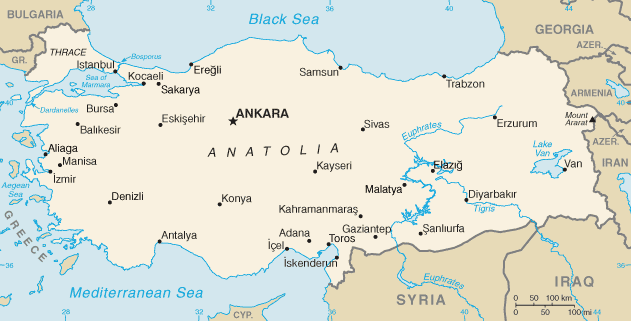| Revision as of 15:47, 22 April 2004 editJorge Stolfi (talk | contribs)Autopatrolled, Extended confirmed users, Rollbackers27,608 edits fixed ethnic/linguistic status. Plese note that (1) Indo-European is not European (2) Language does not mean race, culture, or ethnicity (3) conquest does not mean replacement← Previous edit | Revision as of 15:55, 22 April 2004 edit undoJorge Stolfi (talk | contribs)Autopatrolled, Extended confirmed users, Rollbackers27,608 edits fixd wording, + LuwiansNext edit → | ||
| Line 6: | Line 6: | ||
| The settlement of ] starts in the Neolithic, but continues up into the Iron age. | The settlement of ] starts in the Neolithic, but continues up into the Iron age. | ||
| Major civilizations and peoples that have settled in or conquered Anatolia include the ], ], ]ns, ]s, ]ns, ]ns, ]s, ]s, ]s, ], ], ]ns, ], ], ], ], ] and ]. These peoples belonged to many varied ] and ] traditions. Anatolians have spoken both ] and ] languages, as well as many languages of uncertain affiliation. |
Major civilizations and peoples that have settled in or conquered Anatolia include the ], ], ], ]ns, ]s, ]ns, ]ns, ]s, ]s, ]s, ], ], ]ns, ], ], ], ], ] and ]. These peoples belonged to many varied ] and ] traditions. Through recorded history, Anatolians have spoken both ] and ] languages, as well as many languages of uncertain affiliation. In fact, given the antiquity of the Indo-European ] and ] languages, some scholars have proposed Anatolia as the hyApothetical center from which the Indo-European languages have radiated. Other authors have proposed an Anatolian origin for the ] of ancient ]. | ||
| Today the ihnabitants of Anatolia are mostly ] speakers, due to the conquest of Anatolia by Turkic peoples (and subsequent ]ification) in mediaeval times. A significant ] ethnic minority exists in the southern regions, next to the frontiers with ] and ]. | Today the ihnabitants of Anatolia are mostly ] speakers, due to the conquest of Anatolia by Turkic peoples (and subsequent ]ification) in mediaeval times. A significant ] ethnic and linguistic minority exists in the southern regions, next to the frontiers with ] and ]. | ||
| ] | ] | ||
Revision as of 15:55, 22 April 2004
Anatolia (Greek anatole for "rising of the sun" compare "Orient" and "Levant"), also called by the Latin name of Asia Minor, is a region of Southwest Asia which corresponds today to the Asian portion of Turkey (Turkish: Anadolu).
Because of its strategic location at the intersection of Asia and Europe, Anatolia has been a cradle for several civilizations since prehistoric ages, with neolithic settlements such as Catal Höyük (pottery neolithic), Cayönü (PPN), Nevali Cori (PPN B), Hacilar (pottery neolithic) and Göbekli Tepe (PPN A) and Mersin. The settlement of Troy starts in the Neolithic, but continues up into the Iron age.
Major civilizations and peoples that have settled in or conquered Anatolia include the Hattians, Luwians, Hittites, Phrygians, Cimmerians, Lydians, Persians, Celts, Tubals, Meshechs, Greeks, Pelasgians, Armenians, Romans, Goths, Kurds, Byzantines, Seljuk Turks and Ottomans. These peoples belonged to many varied ethnic and linguistic traditions. Through recorded history, Anatolians have spoken both Indo-European and Semitic languages, as well as many languages of uncertain affiliation. In fact, given the antiquity of the Indo-European Hititte and Luwian languages, some scholars have proposed Anatolia as the hyApothetical center from which the Indo-European languages have radiated. Other authors have proposed an Anatolian origin for the Etruscans of ancient Italy.
Today the ihnabitants of Anatolia are mostly Turkish speakers, due to the conquest of Anatolia by Turkic peoples (and subsequent Islamification) in mediaeval times. A significant Kurdish ethnic and linguistic minority exists in the southern regions, next to the frontiers with Iraq and Iran.
